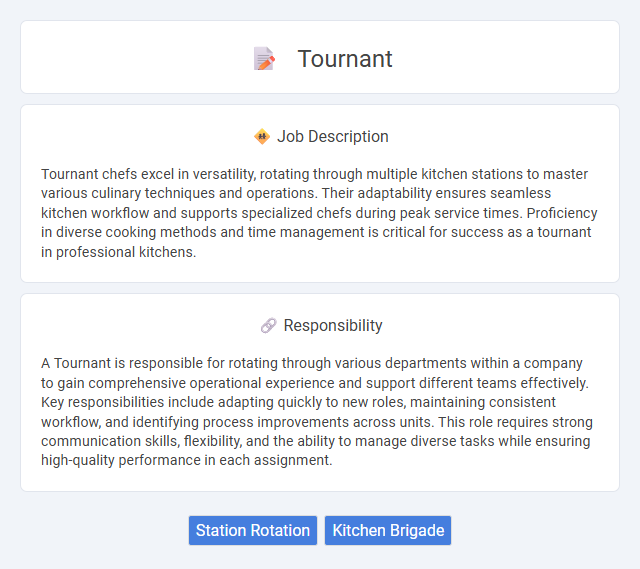
Tournant chefs excel in versatility, rotating through multiple kitchen stations to master various culinary techniques and operations. Their adaptability ensures seamless kitchen workflow and supports specialized chefs during peak service times. Proficiency in diverse cooking methods and time management is critical for success as a tournant in professional kitchens.
Individuals who thrive in dynamic environments with strong organizational skills are likely to be suitable for a Tournant job. Those comfortable with frequent changes and adaptable work schedules might find this role aligns well with their strengths. Candidates lacking flexibility or preferring routine tasks may face challenges in meeting the demands of this position.
Qualification
Tournant positions require a strong foundation in multitasking and adaptability, often demanding experience in various operational roles within manufacturing or production environments. Candidates should possess technical skills, such as proficiency with machinery or quality control processes, alongside excellent problem-solving abilities. Certifications in safety standards and lean manufacturing principles enhance employability and performance in Tournant roles.
Responsibility
A Tournant is responsible for rotating through various departments within a company to gain comprehensive operational experience and support different teams effectively. Key responsibilities include adapting quickly to new roles, maintaining consistent workflow, and identifying process improvements across units. This role requires strong communication skills, flexibility, and the ability to manage diverse tasks while ensuring high-quality performance in each assignment.
Benefit
Working as a tournant may offer increased flexibility and exposure to various departments, potentially enhancing skill development and career advancement opportunities. There is a probability of gaining diverse experience, which can improve problem-solving abilities and adaptability in the workplace. This role might also lead to better job security due to the versatility acquired.
Challenge
Working as a Tournant often involves facing unpredictable challenges that require quick adaptation and problem-solving skills. The likelihood of encountering diverse tasks across various departments means flexibility is essential. Mastering these challenges can significantly enhance professional growth and strengthen operational efficiency.
Career Advancement
Tournant jobs provide versatile experience across multiple departments, enhancing adaptability and broadening skill sets critical for career advancement. Exposure to varied operational roles accelerates leadership development and increases eligibility for managerial positions. Employers highly value tournant professionals for their comprehensive organizational insight and problem-solving capabilities.
Key Terms
Station Rotation
A tournant job in culinary settings primarily involves mastering the station rotation system, where chefs seamlessly transition between various kitchen stations to maintain efficiency and consistency in food preparation. This role demands comprehensive knowledge of multiple culinary techniques, ingredient handling, and timing coordination across different sections such as saute, grill, and pastry. Effective station rotation enhances kitchen workflow, reduces bottlenecks during service, and ensures high-quality dish output in fast-paced environments.
Kitchen Brigade
A Tournant, also known as the roundsman, is a versatile chef in the kitchen brigade responsible for rotating through various station chefs to ensure smooth kitchen operations. This role requires extensive knowledge of multiple cooking techniques, menu items, and a strong ability to coordinate between different kitchen stations such as garde manger, saute, and pastry. The Tournant supports the Head Chef by filling in for absent chefs, maintaining quality standards, and enhancing team efficiency during peak service hours.
 kuljobs.com
kuljobs.com